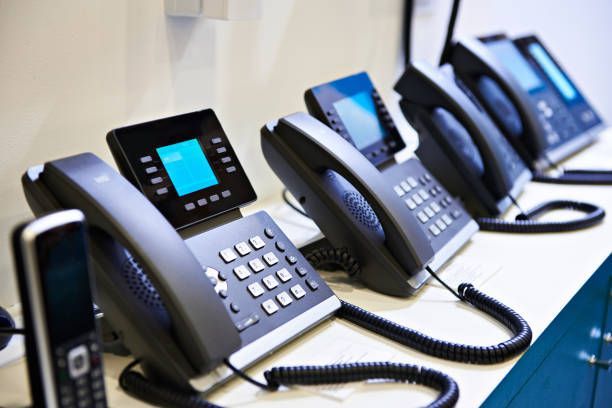Cybersecurity and Business Phones: Protecting West Texas Companies from Threats
The Growing Importance of Business Phone System Security

In today's digital age, cybersecurity is a top priority for businesses of all sizes and industries, and West Texas companies are no exception. While many organizations focus on securing their computer networks and data, one often-overlooked area is the business phone system. These systems are a crucial part of daily operations, facilitating communication with customers, suppliers, and employees. As such, they can also be vulnerable to cyber threats. In this comprehensive guide, we'll explore the importance of cybersecurity for business phones and strategies to protect West Texas companies from potential threats.
In an increasingly connected and digital business landscape, the security of business phone systems has become paramount. Business phone systems are no longer confined to traditional landlines; they have evolved into Voice over Internet Protocol (VoIP) and unified communication systems that rely on the internet for voice and data transmission. This evolution brings about new and more complex security challenges that demand immediate attention. The importance of business phone system security has grown for several reasons:
Digital Transformation: As businesses undergo digital transformation, they rely on interconnected communication systems that integrate with other technologies. This integration creates vulnerabilities that cybercriminals can exploit.
Data Privacy: Business phone systems often handle sensitive customer information and internal communications. Breaches in these systems can lead to data theft and privacy violations, resulting in legal and financial repercussions.
Disruption and Downtime: Cyberattacks on business phone systems can disrupt daily operations, leading to downtime and lost revenue. Service interruptions can significantly impact customer satisfaction and trust.
Rising Cyber Threats: The cybersecurity landscape is continually evolving, with cyber threats becoming more sophisticated and targeted. To mitigate risks, businesses must adapt and strengthen their phone system security.
Regulatory Compliance: Many industries have specific regulations concerning data protection and privacy, such as HIPAA in healthcare. Non-compliance can lead to severe penalties, making security a legal requirement.
Business phone systems have evolved significantly in recent years. Traditional landlines have given way to Voice over Internet Protocol (VoIP) systems, which leverage the internet for communication. While this shift has brought numerous benefits, it has also introduced new cybersecurity challenges. West Texas companies must recognize the importance of securing their business phone systems for several reasons:
Data Privacy: Business phone systems often handle sensitive customer information. Unauthorized access to this data can lead to privacy breaches and legal consequences.
Financial Impact: Cyberattacks on business phone systems can result in financial losses, including costs related to service disruption, extortion, and legal fees.
Reputation Management: A security breach can damage a company's reputation, eroding customer trust and loyalty.
Regulatory Compliance: Many industries have specific regulations regarding the handling of customer data. Non-compliance can lead to fines and penalties.
Operational Disruption: Disruptions to business phone systems can halt operations, affecting customer service, sales, and overall productivity.
Common Cybersecurity Threats to Business Phone Systems
West Texas companies face various cybersecurity threats that can compromise the integrity of their business phone systems. Some of the most common threats include:
Phishing Attacks: Cybercriminals send deceptive emails or messages, often posing as legitimate entities, to trick employees into revealing sensitive information or login credentials.
Vishing (Voice Phishing): Attackers use voice calls to impersonate legitimate entities and manipulate employees into sharing confidential information over the phone.
Denial of Service (DoS) and Distributed Denial of Service (DDoS) Attacks: These attacks overwhelm a business phone system with excessive traffic, causing service disruption and loss of communication.
Malware and Ransomware: Malicious software can infect business phone systems, leading to unauthorized access, data theft, or ransomware attacks.
Eavesdropping: Hackers can intercept calls and eavesdrop on sensitive conversations, potentially gaining access to confidential information.
Unsecured VoIP Connections: Insecure VoIP connections can be exploited by hackers to infiltrate the system, leading to unauthorized use and data breaches.
Cybersecurity Best Practices for Business Phone Systems
To protect West Texas companies from the growing threat landscape, it's essential to implement strong cybersecurity practices for business phone systems. Here are key strategies to consider:
Regular Security Audits: Conduct routine security audits of your business phone system to identify vulnerabilities and assess the effectiveness of existing security measures.
Access Control: Implement strict access control policies, restricting access to authorized personnel only. Utilize strong authentication methods, such as multi-factor authentication (MFA), to enhance security.
Employee Training: Educate employees about cybersecurity best practices, including how to recognize phishing attempts, vishing attacks, and other social engineering tactics.
Encryption: Use encryption for calls and data transmission to safeguard sensitive information from eavesdropping and interception.
Firewall Protection: Install firewalls to filter incoming and outgoing traffic, blocking malicious attempts and minimizing the risk of unauthorized access.
Security Updates: Regularly update and patch your business phone system to address known vulnerabilities and protect against malware and ransomware.
VoIP Security Measures: Ensure your VoIP system is protected with strong passwords, encryption, and security configurations to prevent unauthorized access.
Service Provider Evaluation: If you use a third-party service provider for your business phone system, evaluate their cybersecurity measures and ensure they meet your security standards.
Incident Response Plan: Develop a comprehensive incident response plan that outlines the steps to take in the event of a security breach, including communication with relevant authorities.
Backup and Recovery: Implement robust backup and recovery procedures to ensure data availability in case of a cybersecurity incident.
The Unique Challenges and Solutions for West Texas Companies
West Texas companies may face unique challenges when it comes to cybersecurity for their business phone systems. The region's wide geographical area and varying levels of internet infrastructure can present obstacles. However, these challenges can be addressed with tailored solutions:
Rural Connectivity: Companies in more remote areas of West Texas may face limited internet connectivity options. In such cases, utilizing a mix of technologies, such as satellite and cellular connections, can provide redundancy and ensure continuous communication.
Industry-Specific Regulations: Certain industries in West Texas, such as energy and healthcare, have specific regulations for data protection. It's essential to implement cybersecurity measures that align with these industry standards.
Collaboration with Local Experts: West Texas is home to experts in various fields, including technology and telecommunications. Collaborating with local experts can help tailor cybersecurity solutions to regional needs.
Emergency Preparedness: West Texas is prone to natural disasters, such as hurricanes and tornadoes. Disaster recovery and business continuity planning are essential components of a comprehensive cybersecurity strategy.
Cybersecurity for business phone systems is a critical component of protecting West Texas companies from evolving cyber threats. By recognizing the importance of securing these systems and implementing best practices, businesses can safeguard their sensitive information, maintain operational continuity, and protect their reputation. With a proactive approach to cybersecurity, West Texas companies can navigate the digital landscape with confidence and resilience.
OUR SERVICE AREAS
We are based in Lubbock, Texas but also service the surrounding areas, including but not limited to the following:
Texas:
Abilene
Plainview
Post
Levelland
Littlefield
Brownfield
Snyder
Sweetwater
Lamesa
Tulia
Dimmit
Muleshoe
Crosbyton
Tahoka
Seminole
Big Spring
Monahans
San Angelo
Pampa
Borger
Slaton
Comanche
Abernathy
Idalou
Hereford
Canyon
Colorado City
Seagraves
Denver City
New Mexico:
Clovis
Portales
Hobbs
Roswell
Ruidoso
All Rights Reserved| Hays Communications
Website Managed by
Leads By Vinny




